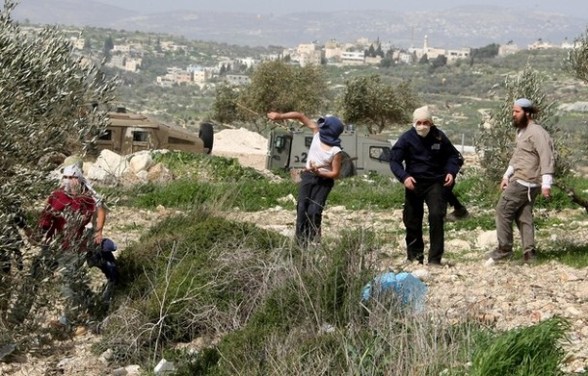RAMALLAH, February, 5 2024 (WAFA) – For three weeks, the Israeli occupation forces have continued their attacks on the village of Al-Funduq, east of Qalqilya, by carrying out demolitions and distributing notices to stop construction and demolition, in addition to setting up military checkpoints and obstructing the movement of citizens.
The official in charge of the wall and settlement file in Qalqilya governorate, Munif Nazzal, told WAFA that the occupation has recently escalated its attacks on the village of Al-Funduq in an unprecedented manner. Since mid-January of this year, it has demolished seven commercial, residential and agricultural structures.
The occupation forces handed nine Palestinians decisions to stop construction in their homes, and 13 notices to commercial complexes to remove what are called "encroachments" on the public road.
Earlier yesterday, the occupation attacked the secondary entrances to the village, including the entrance road to the villages of "Hajjah and Baqa al-Hatab", and proceeded to install traffic signals that reversed the traffic directions, as these entrances became one-way, where entry is permitted and exit is prohibited.
Additionally, the occupation has been closing these entrances with earth mounds since the escalation of the attacks and has also set up permanent military checkpoints at the main eastern and western entrances of the village, impeding the movement of citizens.
In turn, the Director of the Ministry of National Economy in Qalqilya governorate, Hussam al-Shaer, said that half of the village's citizens depend on trade for their livelihood, through their shops located along the main street, whose owners recently received notices to remove them under the pretext of assaulting the public street.
He stressed that the occupation's measures contributed to weakening the commercial movement in the village, as the main street used to be used by approximately 10,000 citizens from all the population centers surrounding the governorate, but today, due to the ongoing occupation measures, commercial movement in the village has weakened.
Al-Shaer pointed out that the notices received by citizens under the pretext of "removing encroachments" are located on the public street, most of which are commercial establishments, and threaten approximately 60 shops, which provide a livelihood for approximately 150 individuals.
This matter requires immediate action to stop the implementation of these procedures, noting that the notices do not contain a final date for objection or implementation of the decisions.
According to the head of the village council, Louay Taym, the number of residents of the hotel is 1,400 people living on an area of 1,400 dunams, of which 1,320 dunams are located within the so-called C areas, most of which are along the colonial road that connects the cities of Qalqilya and Nablus.
He pointed out that the occupation is trying in every way to protect its colonists at the expense of the citizens' lands and facilities, as there is hardly a day without new punitive measures, as the occupation has begun to put up signs stating that vehicles and citizens are prohibited from parking along the main street, and threatening to impose heavy fines by the occupation police.
Tim added that the vital location of the village makes it a target for the occupation, which is trying to seize it with its strict measures, and force the citizens to leave their lands.
Y.S








